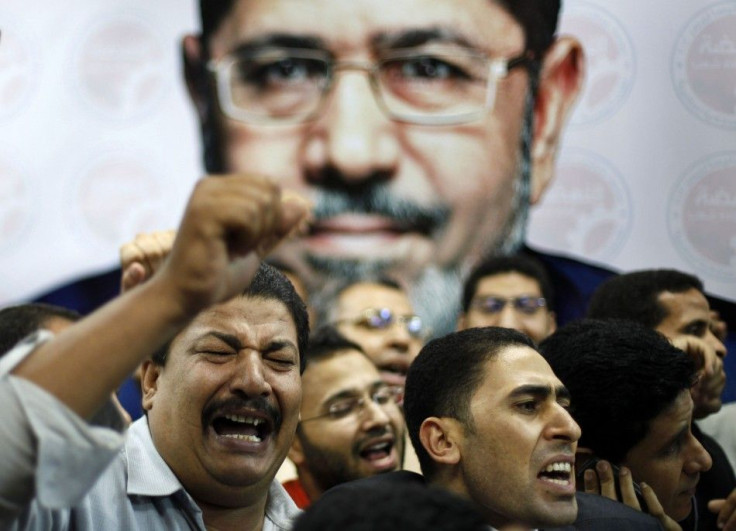Egypt's New President Morsi Begins Work Under The Wary Gaze Of Military And Israel

After a week of restive anticipation, Mohamed Morsi was declared the winner of Egypt's presidential elections on Sunday. With 52 percent of the vote, the Freedom and Justice Party (FJP) candidate edged out Ahmed Shafiq, the last prime minister of Egypt under Hosni Mubarak.
An Islamist with the Muslim Brotherhood's political arm, Morsi has been tasked with rebuilding the country's institutions after the fall of the old regime. Part of his platform will be the institution of some form of sharia law -- he believes Islam is the solution -- as promised during his campaign. But his main priorities will be rebuilding the economy and reforming the many ministries still clogged with Mubarak policies and personnel. He will also need to calm an excited, mostly secular, activist community.
But political aspirations aside, with the Supreme Council of the Armed Forces -- which took control of the country after Mubarak's resignation -- still tightly holding onto power, Morsi might not have the authority to make any real changes yet.
Ironically, when it had a plurality of seats in the Peoples' Assembly, the Muslim Brotherhood's Freedom and Justice Party favored a parliamentary system of government with a figurehead president. Now that figurehead will be the FJP leader, and the military is the legislative body, said Egypt expert Zack Gold in the National Interest on Friday.
Many believe that the military's power grab will lead to the long-awaited confrontation between the SCAF and the Muslim Brotherhood. While they differ on many issues -- domestic and foreign -- the first battle will likely be around the constitutional draft committee. The SCAF disbanded the second iteration of the committee last week, giving itself the final say in its eventual composition, which means that if gone unchallenged, the military will determine how much power the president has going forward (as well as how much power it wants to keep for itself).
That is where the first real contest between the two sides is going to break out, Bob Bowker, a former Australian ambassador to Egypt, told 'The World Today' radio program.
Is the constitutional assembly and its reworked shape going to remain the basis for producing a new constitution, or is the Brotherhood going to find itself under pressure or outflanked by the military, who are simply going to insist on certain provisions?
Israeli Reaction
Abroad, the political consequence of Morsi's win has yet to be seen, but his presidency is of significant concern to Egypt's neighbors east of the Sinai Peninsula. Throughout the revolution and subsequent rebuilding process, Israel has kept a concerned gaze on its ally, waiting to see if an Islamist-dominated government will affect the peace treaty signed by Mubarak.
Morsi isn't yet certain about what Egypt's future relationship with Israel is going to be. Iranian state news agencies are claiming that Morsi wants to create a strategic balance in the Middle East by building a relationship with Tehran, and also reconsider the Camp David Accord. Traditionally, the Shiite government in Iran would be antagonistic toward the Sunnis in the Muslim Brotherhood, but the two have a common bond over the Palestinian issue -- the Brotherhood because of the Sunni connection with Palestinians, and Iran because of its hatred of Israel.
Officially, Israel isn't showing its hand. Prime Minister Benjamin Netanyahu stated over the weekend that Israel appreciates the democratic process in Egypt and respects the results of the presidential elections adding that Israel looks forward to continuing cooperation with the Egyptian government on the basis of the peace treaty between the two countries, which is a joint interest of both peoples and contributes to regional stability.
But Morsi must also consider the views of his constituents, most of whom want the peace treaty with Israel revoked. Additionally, some Brotherhood members still vow never to meet with Israelis, according to the Associated Press, and Morsi has recently described Israeli leaders as vampires and killers.
[Morsi] is someone who reflects a lot of the beliefs of many ordinary Egyptians, including conspiracy theories about the role of the United States and Israel and so on, in the region, said Bowker.
Nonetheless, Morsi has promised not to disrupt the Camp David Agreement, in part because it would be disastrous for Egypt's relationship with the United States, which gives Cairo over a billion dollars in aid every year.
People in Egypt are looking for a livelihood, and if he wants to maintain Egypt's financial resources, he will have to abandon the path of confrontation with Israel, Binyamin Ben-Eliezer, an Israeli Labor Party legislator and former defense minister, stated on Sunday.
© Copyright IBTimes 2024. All rights reserved.





















